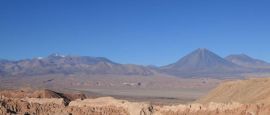Chile: Doing business & staying in touch
Doing business in Chile
Business life in Chile remains formal both in dress code and conduct. When meeting an associate, greeting them with a firm handshake accompanied by a smile and direct eye contact, is appropriate for a business setting. Business cards are immediately exchanged, and titles and surnames should be used until otherwise invited. Chileans may stand quite close to each other when speaking.
In a business environment, usted, the polite Spanish form of address, should be used instead of the more familiar tu. Failure to observe this linguistic etiquette could be construed as disrespectful or even arrogant. Some Chilean executives speak reasonably competent English, but any attempt to use Spanish, however faltering, will be greatly appreciated.
Like their counterparts in North America and Europe, members of Chile's business community make good use of the working lunch. Meanwhile, Chile's international hotels, especially in the capital Santiago, have benefited in recent years from the increased popularity of the 'business breakfast'. The best months for business visits are April to December. The summer months of January and February are slower, as Chileans tend to holiday then. Chileans are generally very hospitable and it is not unknown for foreign business travellers to be invited to dinner at home.
Be careful when inviting an important business client for coffee. There are many cafés spread throughout Santiago, especially close to Plaza de las Armas, which offer more than just coffee. Known as a ‘café con Piernas’ baristas here are typically 20-something women wearing some form of bikini or lingerie ensemble. These cafés can be recognized by the fact the all windows facing the outside are heavily tinted or covered with advertisements.
Usually Mon-Fri 0900-1800, although Chilean business workers are known for working long hours.
With well-developed industrial and service sectors, Chile has one of Latin America's strongest economies. However, it still depends on export of primary commodities (metals and ores, fruit, fish and wood) for a large proportion of its export earnings. With commodity prices dropping recently, harsher times look likely for the Chilean economy, in line with the straitened financial times across the world.
However, Chile's industrial base has grown substantially over the last decade and includes steel manufacturing, oil production, ship building, and the production of cement and consumer goods. The mainstay of the export economy is still metals and ores: Chile is the world's leading exporter of copper and also produces zinc, iron ore, molybdenum, manganese, iodine and lithium.
The service sector has developed rapidly, especially financial services. Chile's economic performance has been strong since 2000; unemployment was estimated at roughly 6% in early 2014.
Petroleum, vehicles, natural gas, excavating machinery, electrical and telecommunications equipment.
Keeping in Touch in Chile
Public phone boxes are unreliable, and visitors will find it cheaper to use phones in centros de llamadas (call centres) in towns, or at internet cafes.
Roaming agreements exist with most international mobile phone companies. Coverage is good in built-up areas, less so outside of the towns. It is also cheap and easy to buy your own if you are in the country for any length of time, although calls are not especially cheap.
Pre-paid SIM cards can be used in unblocked phones allowing cheaper calls within Chile. For all-round country coverage, Entel (www.entel.cl) and Movistar (www.movistar.cl) are Chile’s largest networks.
Internet cafés are open all hours in the main towns and tourist areas. Many hotels and hostels will have access to the internet which is relatively cheap at around US$1 for 30 minutes, while free Wi-Fi is also becoming increasingly popular, with many hotels offering this.
The postal service, Correos de Chile (www.correos.cl), is reasonably reliable. Airmail to Europe and the USA takes anything from four days to a week.
Mon-Fri 0830-1900; Sat 0830-1300. The central post office in Santiago is located at Plaza de Armas 559. Post offices in villages are likely to have reduced opening hours.
Chile enjoys a reasonable level of press freedom, which is now enshrined in the constitution. There is, however, a heavy conservative tilt to the media, which has never quite redressed the imbalance of the Pinochet-era restrictions. The Santiago Times is the only English language daily in Chile whilst Spanish dailies include El Mercurio, La Tercera, conservative evening newspaper La Segunda, business newspaper El Diario, and government-run La Nación. The Patagonia Times concentrates on news in the country's south.
Television was introduced in 1957 and national broadcasters include Canal 13, which is part-owned by the Catholic church, UCV Televisión, Chilevisión (owned by Sebastián Piñera, the Chilean politician and businessman widely tipped to become the next president), TVN, Mega, RED TV and Telecanal. Although state-owned, National Television of Chile is not under direct government control. Radio stations include Radio Nacional de Chile, news-based national commercial network Radio Cooperativa and music-based Radio Horizonte. Santiago Radio is a fledgling English-language online station.








 You know where
You know where